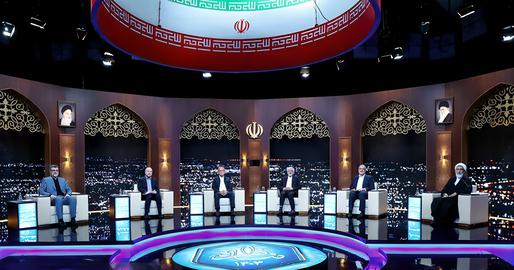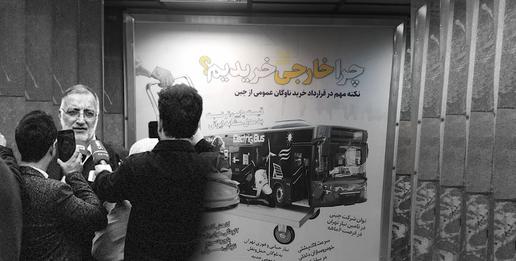If Ebrahim Raisi had survived, he would soon be campaigning for reelection in next year’s presidential elections.
A politician linked to the 1988 mass executions, Raisi was seen as a potential successor to Ali Khamenei and a candidate for the position of the third Supreme Leader of the Islamic Republic.
Three years ago, in spring 2021, amid widespread dissatisfaction among Iranian citizens with the electoral process under Khamenei's administration, Ebrahim Raisi was elected president.
He received the lowest percentage of votes ever recorded for a president in Iran, succeeding Hassan Rouhani, who had promised to restore "credibility" to the presidency.
Raisi was the first and only Iranian president to be sanctioned by both the European Union and the United States due to his involvement in the suppression of Iranian citizens.
Dubbed the "Butcher of Tehran" by some in Iran, his popularity quickly waned after initial speeches where he struggled to articulate his points and failed to resonate with the public.
His reputation was largely due to his role in ordering thousands of executions during the summer of 1988.
In his first statement following his election victory, Raisi defended his involvement in the 1988 executions and asserted that he should be commended for it.
The cabinet he introduced to parliament set a clear direction for Iran under his presidency and Khamenei's ongoing leadership into its fourth decade.
His interior minister, Brigadier General Ahmad Vahidi, was the first commander of the IRGC Quds Force and was wanted by Argentina for his involvement in a bombing in Buenos Aires.
His foreign minister, Hossein Amir-Abdollahian, a former deputy to Mohammad Javad Zarif and a representative of the Quds Force in the Ministry of Foreign Affairs, was killed in a helicopter crash alongside Raisi.
Political instability in Iran escalated even before Raisi officially took office.
Nuclear negotiations to revive the JCPOA, which had begun in April 2021, were suspended on the day the election results were announced.
In a final meeting between Rouhani's government delegation and Khamenei, the draft agreement was rejected, and the Rouhani administration was labeled "a source of national lesson" for its perceived failure in negotiating with Western governments, particularly the United States.
During his election campaign and the initial months of his presidency, Ebrahim Raisi expressed interest in reviving the JCPOA agreement.
However, even if he had not been killed on May 19, 2024, the likelihood of Iran implementing the agreement during the remainder of his term was close to zero.
Raisi was effectively sidelined in this matter, with crucial decisions being made elsewhere, specifically in the leadership's residence just a few meters from the presidential office.
Ali Khamenei had repeatedly indicated since Raisi's election that he was no longer interested in an agreement with the United States.
In one of his last statements, Khamenei mentioned that agreeing would mean paying a ransom to the US, something he stated the government and people of Iran would not do.
Raisi also inherited an extrajudicial council from Rouhani's tenure: the "Economic Coordination Council of the Heads of Power."
This council, established with Khamenei's approval to bypass US sanctions, effectively diluted the president's authority by sharing powers with the head of the judiciary and aiming to circumvent parliamentary decision-making.
This council's formation and function underscored the shifting power dynamics in Iran, where significant policy decisions, especially regarding international agreements and economic strategies, were increasingly controlled by Khamenei and his close circle, rather than the elected president.
In the Economic Coordination Council of the Heads of Power, the Speaker of the Parliament's decision effectively replaced the authority of the 289 members of the Parliament, while the head of the judiciary, who had no direct role in the day-to-day administration of the country, interfered chaotically with the president's powers.
During his less than three-year presidency, Ebrahim Raisi failed to reduce inflation, improve foreign relations, or alleviate the internal crises of the Islamic Republic.
Instead, his administration saw inflation reach unprecedented levels, and the devaluation of the Rial continued at an alarming rate.
Relations with neighboring countries did not improve, for the first time, Iran and Pakistan officially targeted each other's territories.
Additionally, a counterattack between Iran and Israel, which previously took place on Syrian soil, occurred directly from Iranian soil against Israel.
The UAE upgraded its diplomatic relations with the Islamic Republic to the ambassadorial level but also internationalized the issue of the three disputed islands, involving countries like China, Russia, and even Syria under Bashar Assad's rule.
Russia hosted Raisi in the early months of his presidency, but this was at the request of Iranian officials rather than an invitation from Vladimir Putin.
The initial ceremonies in Moscow were so humiliating that Iranian officials were compelled to claim an achievement that Raisi prayed in the Kremlin Palace.
Raisi made another trip to Russia shortly before his death. Russian officials announced that Putin was willing to stop in Tehran on his return from the UAE and Saudi Arabia to meet with Iranian officials.
However, since Raisi was eager to visit Russia, Putin agreed to receive him there.
Relations with Saudi Arabia, which had been reestablished through a security agreement after seven years, never returned to normal.
Although Raisi travelled to Saudi Arabia, it was for a summit of Islamic leaders to which all heads of Islamic countries were invited, rather than a bilateral visit.
No senior Saudi official visited Iran for a bilateral meeting during his term.
Azerbaijan, whose leader Ilham Aliyev was the last foreign official Raisi met hours before his death, closed its embassy in Tehran, and reports indicated heavy restrictions on centers linked to the Iranian government in Baku.
During Raisi's term, the Islamic Republic remained in a state of unprecedented international isolation.
This isolation was partly due to Raisi's involvement in the mass executions of 1988 and his dark tenure as head of the judiciary, as well as the deadly suppression of protests in 2022 which exposed a serious crisis of legitimacy for Iran's government.
In all these developments, Iranian public opinion viewed the ongoing crisis and stagnation as a result of Khamenei's rule.
They saw Raisi as a reluctant agent rather than a primary figure, thus directing their protest slogans more towards the Supreme Leader rather than Raisi himself.
The final moments of Ebrahim Raisi's life served as a stark reflection of his true standing as president.
Following his election three years prior, his name faded from international prominence, and his last appearance in global headlines came with the crash of his helicopter in the forests of northwestern Iran.
For many hours, the fate of Raisi and his foreign minister remained unknown to the public.
Their deaths were not confirmed until later, and Khamenei's message reassured the Iranian people that the country's operations would continue without disruption.
Raisi had been a prominent figure within the Islamic Republic, ascending from his role overseeing Astan Quds - the shrine of the 8th Imam of Shia - to the head of the judiciary, and eventually to the presidency.
























comments